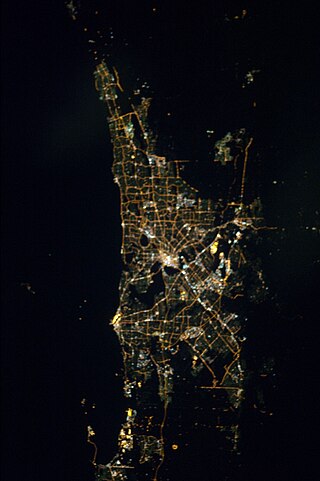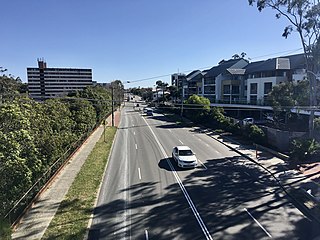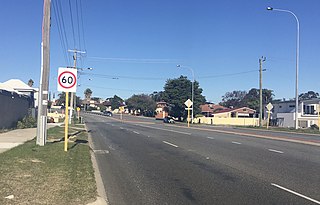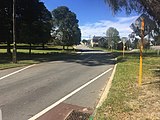
The City of Stirling is a local government area in the northern suburbs of the Western Australian capital city of Perth about 10 kilometres (6 mi) north of Perth's central business district. The City covers an area of 105.2 square kilometres (40.6 sq mi) and has a population of over 223,000, making it the largest local government area by population in Western Australia.

The City of Bayswater is a local government area in the Western Australian capital city of Perth, about 7 kilometres (4 mi) northeast of Perth's central business district. The City covers an area of 34.6 square kilometres (13.4 sq mi) and has a population of 65,050 as at the 2016 Census. The City of Bayswater is a member of the Eastern Metropolitan Regional Council.

The City of Vincent is a local government area of Western Australia. It covers an area of approximately 10.4 square kilometres (4.0 sq mi) in metropolitan Perth, the capital of Western Australia, and lies about 3 km from the Perth CBD. The City of Vincent maintains 139 km of roads and 104 ha of parks and gardens. It had a population of over 33,000 at the 2016 Census.

Maylands railway station is a railway station in Maylands, a suburb of Perth, Western Australia. It is on the Midland line, between Mount Lawley railway station and Meltham railway station. It is 4.5 kilometres (2.8 mi), or 8 minutes by train, from Perth railway station Services run every 10 minutes during peak and every 15 minutes between peak.

The Division of Perth is an Australian electoral division in the state of Western Australia. It is named after Perth, the capital city of Western Australia, where the Division is located.

Bayswater railway station is a railway station in Bayswater, a suburb of Perth, Western Australia. It is on the Midland line, which is part of the Transperth commuter rail network. It has an island platform, accessed via a pedestrian underpass and a level crossing. The station is only partially accessible due to a large platform gap and steep access ramps to the platform. Services run every 10 minutes during peak and every 15 minutes between peak. The journey to Perth railway station is 6.7 kilometres (4.2 mi), and takes 12 minutes. The station is served by three regular bus routes.

Meltham railway station is a railway station in Bayswater, a suburb of Perth, Western Australia. It is on the Midland railway line, between Maylands railway station and Bayswater railway station. It is 5.5 kilometres, or 10 minutes by train, from Perth railway station Services run every 10 minutes during peak and every 15 minutes between peak.

Bedford is a suburb 6 kilometres (4 mi) north-east of the central business district (CBD) of Perth, the capital of Western Australia. Named after Frederick Bedford, the Governor of Western Australia from 1903 to 1909, the suburb is within the City of Bayswater local government area. It is predominantly a low density residential suburb consisting of single-family detached homes, with clusters of commercial buildings along Beaufort Street, Grand Promenade and Walter Road.
Embleton is a suburb of Perth, the capital city of Western Australia, located 7 kilometres (4.3 mi) north-east of the central business district, between the suburbs of Morley and Bayswater. Its local government area is the City of Bayswater.

The Town of Bassendean is a local government area in the northeastern suburbs of the Western Australian capital city of Perth, 6 kilometres (4 mi) west of the industrial centre of Midland and about 12 kilometres (7 mi) northeast of Perth's central business district. The Town covers an area of 10.4 square kilometres (4.0 sq mi), maintains 97 km of roads and had a population of approximately 15,000 as at the 2016 Census. The Town of Bassendean is a member of the Eastern Metropolitan Regional Council.

Bayswater is a suburb 6 km (4 mi) north-east of the central business district (CBD) of Perth, the capital of Western Australia. It is just north of the Swan River, within the City of Bayswater local government area. It is predominantly a low-density residential suburb consisting of single-family detached homes. However, there are several clusters of commercial buildings, most notably in the suburb's town centre, around the intersection of Whatley Crescent and King William Street and a light industrial area in the suburb's east.

The Perth metropolitan region or the Perth metropolitan area is the administrative area and geographical extent of the Western Australian capital city of Perth and its conurbation.

Guildford Road is a major road in Perth, Western Australia, linking the inner-city suburb of Mount Lawley with Guildford in the north-east. The ten-kilometre-long (6.2 mi) road runs mostly parallel to the Swan River, on its northern side, and is part of State Route 51, which runs between Perth's CBD and Midvale. Guildford Road is maintained and controlled by Main Roads Western Australia, which uses the internal designation "H026 Guildford Road" for Guildford Road, as well as Bridge Street and James Street in Guildford. In the 1930s, the name Great Eastern Highway was coined to describe the road, but was actually used for the road on the other side of the Swan River.

Collier Road is a 4.7-kilometre (2.9 mi) main road in the north-eastern suburbs of Perth, Western Australia, linking Morley in the north-west to Bassendean in the south-east. It services an industrial area in Bayswater and Bassendean, the Morley business district, and connects to Tonkin Highway. Collier Road first existed as a gravel track in the 1910s. The 1950s and 1960s saw the land around Collier Road change from rural to urban. It has undergone a major realignment twice, first in the mid-1980s to make room for a larger shopping centre in Morley, and between 2016 and 2018, for the construction of an interchange with Tonkin Highway.

Walter Road is a road in the north-eastern suburbs of Perth, Western Australia. Formerly a continuous road, it is now discontinuous at Tonkin Highway. The western section of the road is known as Walter Road West, and the eastern section of the road is known as Walter Road East.

Cyril Jackson Senior Campus is an Independent Public senior secondary school in Bassendean, a suburb of Perth, Western Australia. It serves approximately 400 compulsory age and mature age students from year 11 to year 12.





























